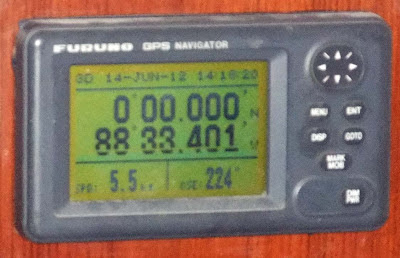Like many North Americans, my foreign
language skills were never the greatest.
It is a sad fact of life that English is the new Latin. You can get away with anything as an English-speaker
- where is the push to branch out? Growing up, French
was something you studied in school because you had to. Oh, maybe you would visit Quebec someday, and having
a second language looked good on your university application. But mostly, you didn’t have a choice, and it
was more about the grade than the learning.
I’ve hesitated to
write this post. I have held back,
because I don’t want to write anything that well-meaning keener parents are
going to wave at their children and say, “See, this is why we encourage you to
study.” But the fact of the matter is
this: the single most useful skill I’ve brought to this sailing adventure is my
ability to speak other languages.
I learned German for the usual
reason: because my boyfriend spoke German.
Erik took a job in Switzerland, and I thought it might be handy when I
visited. (Of course, Swiss German turned
out to be an entirely different animal, but no matter. I had some basic grammar and vocabulary under
my belt.) And then we got married and
moved to Germany, and German became not just handy, but essential. I practiced, I got over my shyness about my
hideous accent, I got a job, and my German got better. And I met some cool people.
After a stint in Boston, we moved
to Montreal. And you had better believe
that you ought to speak French in Quebec.
So I practiced with the doormen in our building, and my terrible French
became slightly less terrible.
I thought my foreign language days
were at an end... then we moved aboard Papillon. And if I had thought about our intended route
at all, I would have taken a Spanish course.
Because my Spanish sucks. I’ve
never taken Spanish, and I feel lost without the basic grammar. I’ve cobbled together some phrases and worked
really hard to understand the people around me, but I still haven’t mapped out the
basics. I’m pretty much back on “Yo voy,”
“Yo deseo,” and “sobre el barco.”
But here is the thing. And while you are breaking your back for your
95% in French or loafing at the back of the room balancing pencils on your
nose, you might not see this. But the
real, actual, completely-for-true reason we learn other languages is to talk to
other people. Not to order at a
restaurant on vacation or get directions to the Metro. That’s crap.
You learn it because people out there are interesting, and different, and
funny and cool and generally awesome, but you are never going to know that
unless you try to talk to them. Not in
English. In their own language. If you want to get to know people, it is time
for you to do some of the heavy lifting.
One of the conversations I’m most
proud of happened with one of the guys working on the dock in Cartagena. It was Christmas, and I managed to explain
the difference between “wrap” and “rap” entirely in Spanish. I was forever La Señora Rap after that, and my friend would go into a rapper pose whenever he
saw me. That is success, my friends.
We made friends in Cartagena on
the strength of Erik’s Spanish. That’s
how we got to spend New Year’s Eve in the Barrio. We had painters aboard for four months, and
by the end Erik was spending Sunday afternoons at their house playing
dominoes. The man who rented us lines
and tires for the Canal crossing told us about how his son got shot in Colon in
a case of mistaken identity. We talked
to the Kuna people living on Miriadiadup about how village life is disappearing. Our policeman friend from Providencia invited
us to visit him in Cali. And so on. We’ve met so many interesting people – some for
a few minutes, some for much longer – that we never would have known otherwise.
Because here is the thing. You can kind of make friends with someone
when you are making them speak English.
But you are going to come out a lot further ahead when you can speak a
little of their own language back to them. And the other thing? Not everyone speaks English. I know!
It’s a shocker! And even more
shocking is they shouldn’t have to.
When we arrived in San Cristobal,
we found two German boats and a Swiss boat here. We have five kids between us, and we have
seen a lot of each other over the past week.
The kids got past the language barrier right away, just as some of Stylish’s
best friends on this trip have been from France and Quebec. We have had a potluck and a birthday party
with our new friends, and I have hauled out my rusty German to the best of my
ability.
I know I make mistakes. I forget my grammar, I forget my vocab, I
lose the thread of the conversation sometimes.
Once upon a time, it would have really bothered me that I wasn’t
speaking correctly. But now, when I see
the relief in other people’s eyes that they can relax and speak their own
language without catering to the North American, I don’t care how many mistakes
I’m making. It’s worth it. Now we’re moving on to the Marquesas, and I’ll
have to dredge out my high school French.
And I’m actually looking forward to it.
So, kids, learn those
languages. Learn six words if that is
all you can manage. But do it. And use those six words whenever you
can. I promise you, what you will get
out of it is better than any grade in school.
 |
| The kids understand. |




















